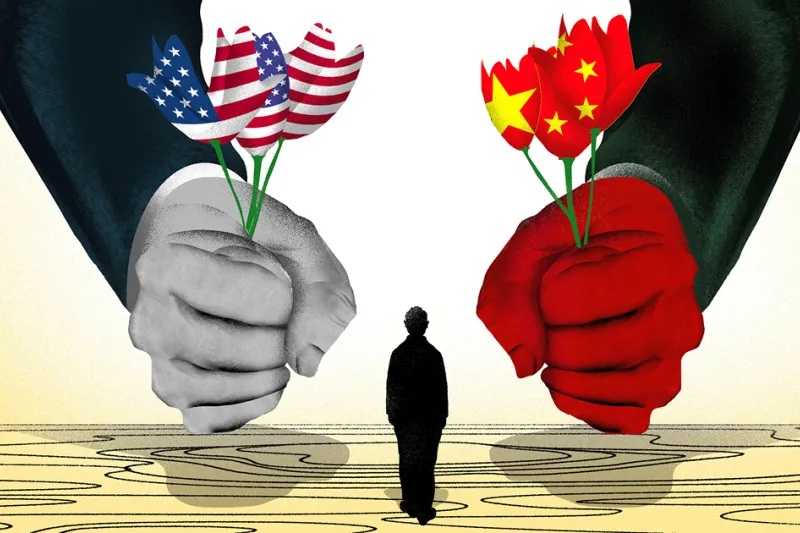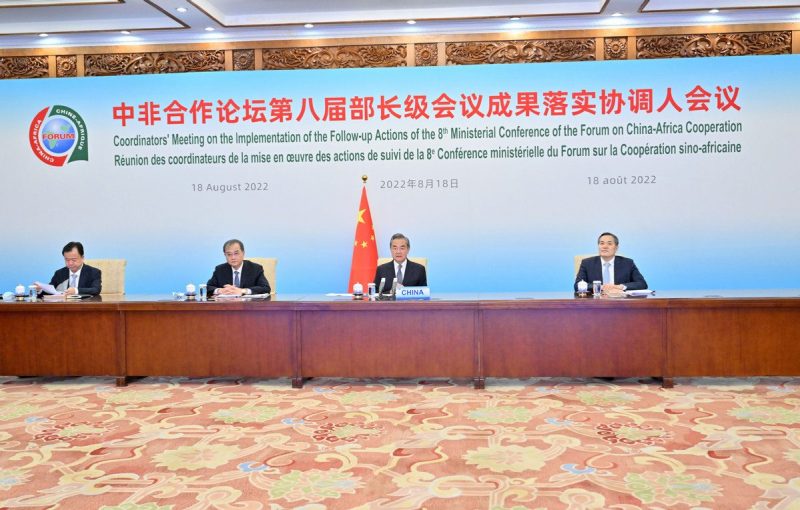China’s Power Display for America in Africa
China’s power display for America in Africa was showcased at the eighth major meeting finalizing the eighth round of activities of the China-Africa Joint Cooperation Group, held last week. This major and key meeting, designed and conducted mostly virtually, was attended by high-level officials. Under Xi Jinping’s leadership, China presented a new aspect of its global policy approach to the world in Africa.
This meeting, held at the ministerial level of member countries of the China-Africa Cooperation Group, was essentially a celebration of Xi Jinping’s leadership and the announcement of the start of the ninth cooperation phase between China and African countries. Within this specific framework, Chinese officials, led by Wang Yi, announced the program to forgive a portion of African debts.
This debt forgiveness will take the form of China waiving 23 interest-free debt items in 17 African countries. Initially, this event seems attractive and promising for African countries, but in reality, a very minor portion of the Chinese claims from these countries has been erased in this specific program.
China, Africa, and Money
The financial reports released at this meeting about China’s financial and economic interactions with African countries contained interesting points. For example, Chinese officials explicitly reported a slowdown in the provision of capital to African financial institutions. The statistics they provided indicated that out of the $10 billion China had committed, only $3 billion had been paid to African banks and financial institutions.
China continues to boast about its COVID-19 aid to African countries, and despite the general awareness of the inefficacy of Chinese vaccines against new variants of the virus, the official report of the meeting made extensive mention of the provision of millions of vaccines to African countries. China’s economic exchanges with African countries, if not expanded, have certainly not been easily reduced. China needs the various resources available in Africa, and the recent period’s statistics show that China’s imports from Africa have exceeded $70 billion.
In this context, it should be noted that from the early days of the COVID-19 outbreak and with the emergence of signs of a crippling economic crisis in China and globally, China began to review its global developmental investment plans. The results of this review and policy change gradually manifested in a step-by-step reduction in providing financial support, guarantees, and loans to different countries. Concurrently, experts and researchers reignited discussions about Chinese investment trends in less developed countries.
The Belt and Road Initiative, a plan with a history of over a decade that has channeled billions of dollars of Chinese investment into various countries, especially less developed ones, is one of the significant pathways of China’s global investment, but it is not the only one.
The new phase of cooperation between China and African countries, as narrated by Chinese officials, is about strengthening their warm relations with Africans. However, it should be said that despite official statements and promises, these investment pathways, although maintained, are seeing a reduction in the overflow of capital into the continent’s countries. Instead, the main Chinese goal is to maintain and develop specific trades and collaborations in particular fields.
One of the striking examples of the reduction in Chinese capital overflow in Africa is Kenya. The amount of credit lent by the Chinese to Kenya in 2016 was over $12 billion, which in the recent fiscal year astonishingly decreased to only $255 million. Chinese cash for borrowing has been replaced by Japanese money in Kenya, and this year, Japan has provided the most loans to Kenya. Nevertheless, Kenya’s total debt to China is nearly $7 billion, which is five and a half times its debt to Japan.
The Shadow of China-US Economic Rivalry on the Cooperation Group
It is natural that serious discussions about very sensitive topics in the relations of the Chinese with specific African countries are not included in the work of this joint group. Various Chinese companies are active in different fields in Africa, and specific cases of disputes and sensitivities have arisen in each of the interacting countries. Disputes involving Chinese mining and industrial companies in countries like Congo have been particularly sensitive.
Nevertheless, Chinese cooperation in this area with Africans is so extensive that even the most serious disputes are considered peripheral issues. A country like the United States has significantly fallen behind the Chinese in such interactions with Africans. The recent trip by Antony Blinken, the U.S. Secretary of State, included various countries and involved important behind-the-scenes negotiations on political and economic issues.
These are the initial steps of the new U.S. approach to Africa, and officially, with the announcement of this country’s new strategic plan for Africa, Blinken unveiled this new phase.
At the China-Africa Cooperation Group ministerial meeting, China demonstrated that it is in a favorable position in Africa. The joint statement by China and the continent’s countries, which strongly supported Chinese policy, indicated the depth of Chinese influence. The statement, clearly crafted by the Chinese and seemingly signed by the Africans without much scrutiny, surprisingly addressed recent developments in China-U.S. relations and the Taiwan issue.
This statement not only supported China’s longstanding One China policy, which implicitly and unofficially acknowledges the lack of Taiwanese independence, but it also explicitly emphasized Xi Jinping’s main policy and real goal of reunifying China and Taiwan, meaning the annexation of Taiwan.


